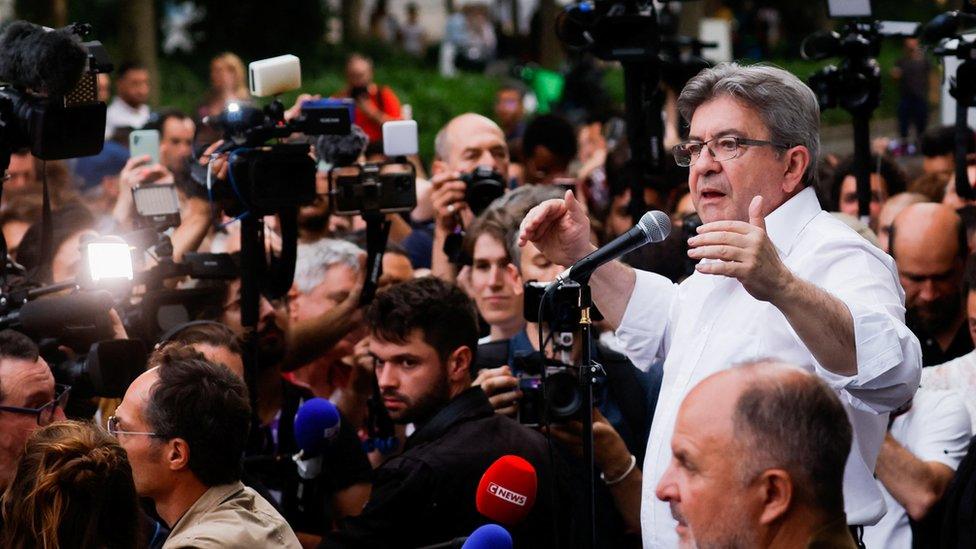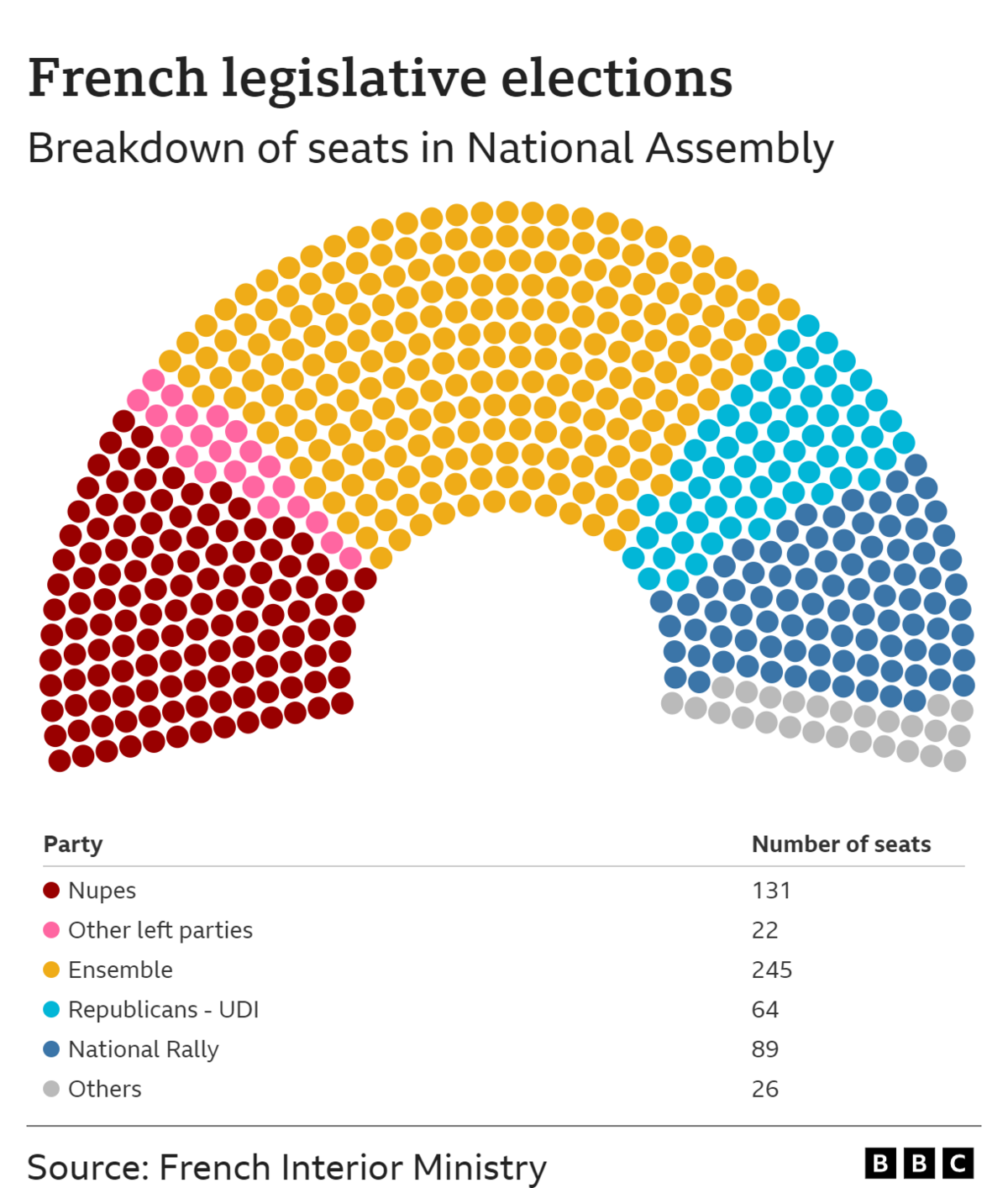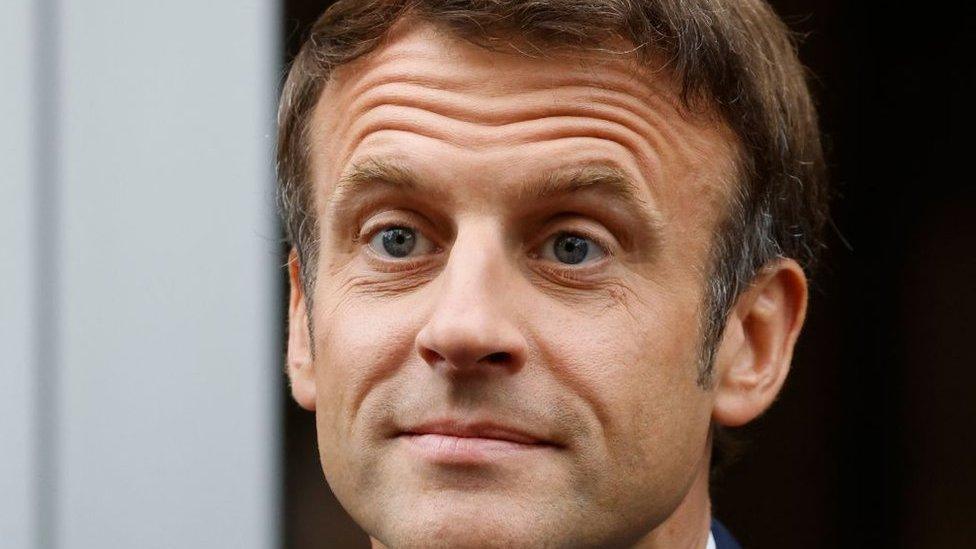France elections: Political uncertainty as Macron party slumps
- Published

Far-left leader Jean-Luc Mélenchon wants a vote of no confidence in Prime Minister Elisabeth Borne
France's centrist government is desperately trying to avoid political paralysis after it lost its majority in the National Assembly.
Prime Minister Elisabeth Borne has spoken of an unprecedented situation and commentators have warned of France becoming ungovernable.
President Emmanuel Macron's team now face two powerful opposition groups.
And neither Jean-Luc Mélenchon's left-green alliance nor Marine Le Pen's far right are keen to work with him.
Mr Macron will also have to replace three ministers who lost their seats in Sunday's vote, and the prime minister's future looks increasingly under threat.
The president's allies came out in force after Sunday's election setback, widely described by commentators as a slap in the face from voters. The aim is to find a "working majority", either a coalition or by forging alliances with other MPs on a case-by-case basis.
"We are going to form a majority very quickly so it becomes absolute in the National Assembly," promised Olivier Véran, the minister in charge of parliamentary relations. Government spokeswoman Olivia Grégoire extended a hand to "all those who want us to move the country forward".


Minority governments are a rarity in France, and even when there was one in 1988 under President François Mitterrand, he was only 11 seats short of an outright majority. The ruling Ensemble alliance is 44 seats shy of the working majority so it will need to find support from mainstream MPs from both the left and right.
Mr Véran believes the government will be able to attract support from other political groups to get important reforms passed, particularly when it comes to the cost of living: "I can't for a second imagine that a majority cannot emerge in the coming weeks on the spending power law."
President Macron has laid out a series of plans to tackle the spiralling cost of living, including food vouchers and enhanced benefits. Another big reform is gradually raising the retirement age from 62-65, which has proved unpopular with much of the electorate.
ANALYSIS: What now for Macron after poll setback?
Public Service Minister Stanislas Guerini said there should be talks with the Republicans on the mainstream right but also with anyone else "who sees an interest in moving forward with reforms that are good for the country". Louis Aliot, from Marine Le Pen's National Rally, said if the government included measures his party wanted, such as a cut in sales tax (VAT) then his parliamentary colleagues would "make the effort to vote for those measures".
However, the initial response from the right-wing Republicans to an alliance was not good. Party chairman Christian Jacob said: "We've campaigned in opposition, we are in opposition, we'll stay in opposition." Another MP, Aurélien Pradié, said he did not have same vision of society as President Macron and did not accept "forced marriages".


There are Republicans who might consider some sort of alliance. Former minister Jean-François Copé said he thought a pact with Mr Macron was vital to "confront the rise of the extremes".
But they would demand a high price from the government. Prime Minister Elisabeth Borne looks increasingly under threat, barely a month after she was appointed by Mr Macron.
Publicly, the government says her position is secure but there is mounting pressure for her to resign, particularly from the left.
Jean-Luc Mélenchon is planning a motion of no confidence against her in the coming weeks, and his colleague Manuel Bompard said the government "cannot just continue as if nothing has happened".
Related topics
- Published20 June 2022
